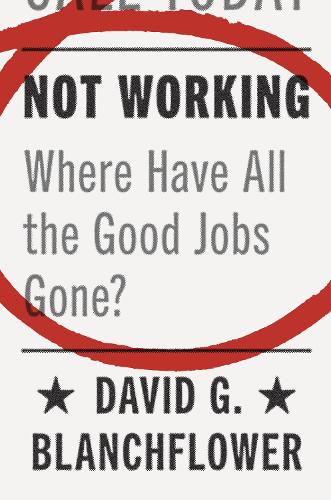
Not Working: Where Have All the Good Jobs Gone
(Hardback)
Available Formats
Publishing Details
Not Working: Where Have All the Good Jobs Gone
By (Author) David G. Blanchflower
Princeton University Press
Princeton University Press
27th August 2019
United States
Classifications
General
Non Fiction
Welfare economics
Economic systems and structures
Central / national / federal government policies
331.13
Physical Properties
Hardback
456
Width 155mm, Height 235mm
Description
A candid assessment of why the job market is not as healthy as we think Don't trust low unemployment numbers as proof that the labor market is doing fine-it isn't. Not Working is about those who can't find full-time work at a decent wage-the underemployed-and how their plight is contributing to widespread despair, a worsening drug epidemic, and
Reviews
"Co-Winner of the Silver Medal in Economics, Axiom Business Book Awards"
"One of Prospect's Best Economics Books of 2019"
"[Blanchflower] makes a strong case. . . . Should Jeremy Corbyn reach 10 Downing Street, he should ring Dartmouth. I cant think of a better choice for Bank of England Governor than David Blanchflower."---Howard Reed, Prospect Magazine
"Blanchflower convincingly demonstrates that behind the boasts of high employment lies the phenomenon of widespread underemployment, with many people working less than they want to, or in jobs way beneath their qualifications."---William Keegan, The Observer
"It is the most anticipated economic book."---Tom Keene, Bloomberg Surveillance
"The most interesting parts of the book . . . are the ones that attempt to draw a link between underemployment, hopelessness, and support for radical right-wing politicians. . . . Blanchflowers main messagethat Western economies are in dire straits unless they take more radical measuresis a welcome corrective to the idea that low unemployment numbers indicate rude economic health. As global growth weakens and the world gets used to what looks like a protracted trade war between the U.S. and China, the question of the lack of good jobs is not going away."---Sharon Lam, Reuters Breakingviews
"Wide-ranging and impeccably researched . . . . [Not Working] is an excellent critique of mainstream economics that explains why many advanced economies labour markets arent working. In doing so, it identifies a number of deep-seated flaws in modern capitalism."---Grace Blakeley, New Statesman
"Challenging and much acclaimed."---Klaus F. Zimmermann, Global Labor Organization
"David Blanchflowers central theme is the crisis of underemployment and underpayment, yet his title Not Working expresses a more general failure of the global economy as well . . . . for mea culpas and an honest if demoralising insider view, read Blanchflower."---Joanna Kavenna, New Scientist
"Not Working: Where Have All the Good Jobs Gone demonstrates that there are still far too few decent jobs in America . . . . The policies proposed by the current crop of presidential candidates indicate that they have not fully absorbed the lessons of low incomes in America."---Jeff Madrick, Book Post
"I didnt know I was interested in labor economics, but this new book by [Blanchflower] is really good. It explores the malaise and dysfunction in the US and Europe and argued cogently that the best strategy forward is jobs, jobs, jobs. And he suggests how to get them."---Nicholas Kristof
"This is a searching and incisive study of the labour market and patterns of work, especially since the financial crash of 2008. It highlights connections between employment, economic policy, politics and mental health, shedding a great deal of light on contemporary developments and building on earlier insights from Keynes and Beveridge (misery leads to hate)." * Paradigm Explorer *
"In this book, Blanchflower, one of the worlds most respected labour market economists, turns his attention to the long-term unemployed and disenfranchised, and explains how their plight has profound ramifications both for society and business." * People Management *
"David Blanchflower delivers a stinging rebuke to his profession, saying economists failure to get out into the real world muddled their models."---Edward Luce, Financial Times
"In his innovative analysis . . . Blanchflower doubles down on cheap money, plus revitalised infrastructure spending, to solve the problem of the 'underemployed'people who cant get decent full-time jobs." * Prospect *
"[Blanchflower] has an impressive command of the literature . . . linking economic decline to indicators of misery."---Jane Humphries and Benjamin Schneider, Project Syndicate
Author Bio
David G. Blanchflower is the Bruce V. Rauner Professor of Economics at Dartmouth College, professor of economics at the University of Stirling, and a research associate at the National Bureau of Economic Research. He is the coauthor of The Wage Curve. He lives in Canaan, New Hampshire. Twitter @D_Blanchflower
